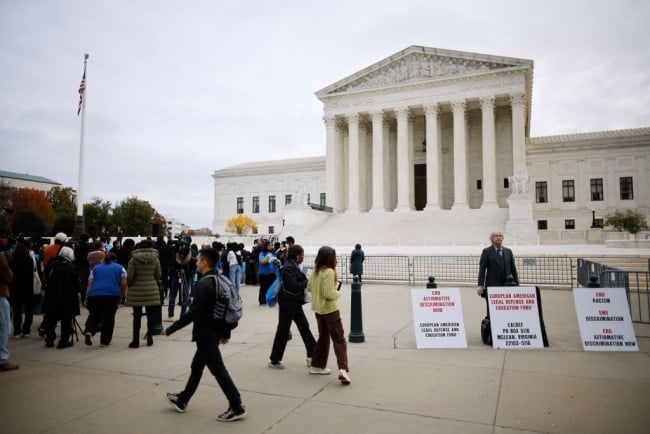You have /5 articles left.
Sign up for a free account or log in.

Chip Somodevilla/Getty Images/Getty Images News
In a 6-to-3 ruling finding race-conscious admissions practices at Harvard University and the University of North Carolina at Chapel Hill to be unconstitutional, the Supreme Court essentially ended affirmative action, upending the elite college admissions landscape.
At the heart of the case against Harvard was the argument that Asian American applicants are systematically disadvantaged by the “personal” score used by the university to gauge applicants’ “soft” qualities like “maturity, integrity, leadership, kindness, and courage”—and, as a result, are admitted in much lower numbers than would otherwise be the case if test scores and other “hard” criteria alone were considered.
The fact that Asian American applicants are disadvantaged by this “soft” measure should rightly prompt a discussion about race, admissions criteria and what colleges ought to value when weighing potential applicants.
The problem is that it prompted the wrong one. This won’t be a win for Asian and Asian American applicants.
My opinions are influenced by my many years of personal experience advising students in the college admissions process. In particular, I work with many Asian American and international Asian students, especially students from China or of Chinese descent. It’s provided insight into the personal and cultural dynamics impacting how Asian and Asian American students present themselves in the college admissions process, and how colleges perceive them. Furthermore, my husband runs our company together with me. He’s Chinese American and earned a degree from Harvard.
One consistently recurring theme in our interactions with Asian students and their families is a conviction that merit and achievement can be precisely quantified and that anything that cannot be easily and objectively quantified simply should not matter. This view shapes many Asian students’ self-perceptions and academic and life paths.
Because of the prevalence of this conviction among many Chinese and Chinese American people, for instance, we often find ourselves arguing with parents fixated on perfectly measurable standards of accomplishment. Seeking such standards is understandable, since it is hard to foster (or broadcast and capitalize upon) achievement without some way of measuring it.
But there is much more to accomplishment than grades and test scores. This is true experientially, in terms of what enriches students’ lives and characters and broadens their perspectives and worldviews.
It is also true from a practical standpoint, in terms of what impresses colleges about an applicant. We struggle to convince many of these parents that there is value in investing in children to elicit qualities that aren’t precisely measurable, since a formulaic approach to grooming kids for top colleges tends to leave little room for students to develop the kind of roaming curiosity that can help them discover personal passions—and stand out in the admissions process, since many top colleges seek applicants who display traits like dimensionality, originality and leadership.
Regardless of whether you believe such traits are objectively valuable, they are a factor in Ivy League admissions decisions—and this is where culture comes in. Even if elite colleges don’t intend to limit the percentage of Asian or Asian American applicants they accept, Asians still end up losing points when the “holistic” admissions process takes those soft criteria into account.
We are all familiar with those stereotypes: Asians are viewed as cold, reserved, robotic geniuses whipped into becoming prodigies by “tiger moms.” They are also stuck with the ultimate stereotype: Asians are all alike, indistinguishable from one another.
Ultimately, there are two possible pitfalls for Asian and Asian American applicants. One is implicit bias that leads admissions officers to perceive them as lacking in desirable personality traits. The other is cultural training that indeed fails to emphasize traits like creativity and self-expression, leading them to present in ways that are less appealing to admissions committees. So the same cultural traits that lead Asian students to excel academically may also stifle their ability to impress non-Asians in other ways.
As such, Asian American students may benefit very little even if affirmative action is over. Research suggests that gains for Asian American applicants in a “test-only” system might be marginal at best and that they would still be subject to the subconscious bias that accompanies having an Asian last name.
To be clear, it’s not that these students aren’t individuals, or bold or creative. It’s just that many have been inculcated with a set of core beliefs and values that lead them to cultivate and highlight certain traits over others.
That’s what we mean when we talk about cultural differences. To state the obvious, people from different parts of the world have different standards for personal space (proxemics), conversational volume, what they deem to be appropriate displays of emotion and many other large and small aspects that contribute to their bearing, personality and character. They also place different emphasis on various kinds of achievement, and many Asian Americans believe their own culture puts too much academic pressure on children. One of the side effects of this culture is that even an atypical Asian candidate—many of whom I also work with—can be viewed through this dominant prism and consequently disadvantaged by the process. The current controversy over Asian American student admissions really boils down to the fact that the methods and traits traditionally ingrained in Asian culture are not appreciated by the Ivy League. Different colleges value different things, just as different cultures value different things.
In this light, it is less important to “win” the argument over whether Harvard’s standards constitute discrimination and more important to deepen the debate by recognizing that what is being discriminated against is not national origin or ethnicity but rather traits that evolve due to specific beliefs and assumptions connected with culture.




